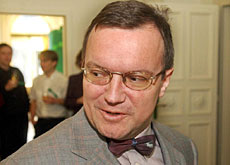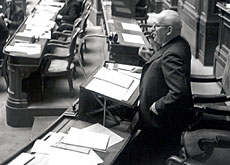Rightwing demand threatens consensus politics

Demands by the rightwing People’s Party for a second seat in the cabinet could put Switzerland’s system of consensus at risk.
But election analyst Claude Longchamp told swissinfo that the party had a right to a second seat and that the system should be able to deal with the change.
The party won the largest share of the vote in Sunday’s parliamentary elections and is now the strongest force in the House of Representatives.
Shortly after the rightwing’s historic victory was announced, People’s Party president Ueli Maurer demanded a second cabinet seat at the expense of one of the other three parties in government.
He threatened that the People’s Party would quit the cabinet completely and move into opposition if this was not done.
On December 10 parliament, which consists of the 200-seat House of Representatives and the 46-seat Senate, is due to elect the cabinet.
swissinfo spoke to Claude Longchamp, a political scientist at the GfS research institute, about the likely implications for Switzerland’s system of consensus politics.
swissinfo: The People’s Party has threatened to leave the cabinet if it does not get a second seat. Would parliament dare to withhold another seat from the party in December?
Claude Longchamp: I think there are three elements to the People’s Party’s demand: firstly it is demanding a second cabinet seat, which is quite reasonable if you consider Sunday’s result and the outcome of the elections four years ago.
The second element is that the party has already put forward a candidate. For them there is only one – and that’s Christoph Blocher.
I do not think that parliament is prepared to accept this demand, as Blocher is the figurehead of the party. It normally requests that all factions put forward two candidates so that the parliamentarians have a choice.
Thirdly, the party has gambled a little bit too much by calling on minister Samuel Schmid to resign if Blocher is not elected. This demand has upset some of the party’s own members as well as the other parties.
swissinfo: Do you think the Magic Formula [system of dividing cabinet seats among the main parties] will change?
C.L.: It depends on which party loses its seat. If the Social Democrats were to lose a seat the basic demand of the Magic Formula, namely to equally represent the big parties, would be null and void.
The centre-right parties were the biggest losers in Sunday’s elections and if the five seats of the Right and the Centre-right were to be newly distributed then we could be faced with a new kind of Magic Formula: People’s Party 2, Radicals 2, Christian Democrats 1 and Social Democrats 2.
swissinfo: Do you expect the Centre-right to go in that direction?
C.L.: Well, if they do, the Christian Democrats would certainly lose one seat.
I am sure the Christian Democrats would try and find a compromise by not putting forward a successor in the event of Joseph Deiss or Ruth Metzler stepping down in the future.
It would then be up to the Radicals and the Social Democrats to accept such a move. The People’s Party and the Radicals together do not form a majority in the newly elected House, which could make it difficult for them to push something through. They would have to get the tacit approval of the Social Democrats if they wanted to act against the Christian Democrats.
swissinfo: You have not mentioned the Swiss People’s Party’s threat to go into opposition. Don’t you think this would be an option?
C.L.: I do not think this would be a long-term option. Switzerland has already gone through various phases where not all parties from left to right were represented in the government.
But even in the medium term I don’t think such a system would last. Our system of direct democracy means that the cabinet and parliament cannot make swings to the left or right.
swissinfo: Does this mean Switzerland would be ungovernable?
C.L.: In the medium term it could be a problem if one of the parties, whether left or right, were not in the government. I believe it is important that the strongest parties are represented in the cabinet, as there they are forced to find compromises and are not able to act in opposition.
Being in the government also means the parties are allowed to direct the political course of the country and that seems to be the right formula. The People’s Party should stay in government but it should be represented by people that other people want to work with.
swissinfo-interview: Eva Herrmann (translation: Billi Bierling)
The Swiss People’s Party won 26.6% of the popular vote, and now has 55 seats in the House of Representatives.
Social Democrats: 23.3% with 52 seats.
Radicals: 17.3% with 36 seats.
Christian Democrats: 14.4% with 28 seats.
Greens (not in government): 7.4% with 13 seats.

In compliance with the JTI standards
More: SWI swissinfo.ch certified by the Journalism Trust Initiative











You can find an overview of ongoing debates with our journalists here . Please join us!
If you want to start a conversation about a topic raised in this article or want to report factual errors, email us at english@swissinfo.ch.